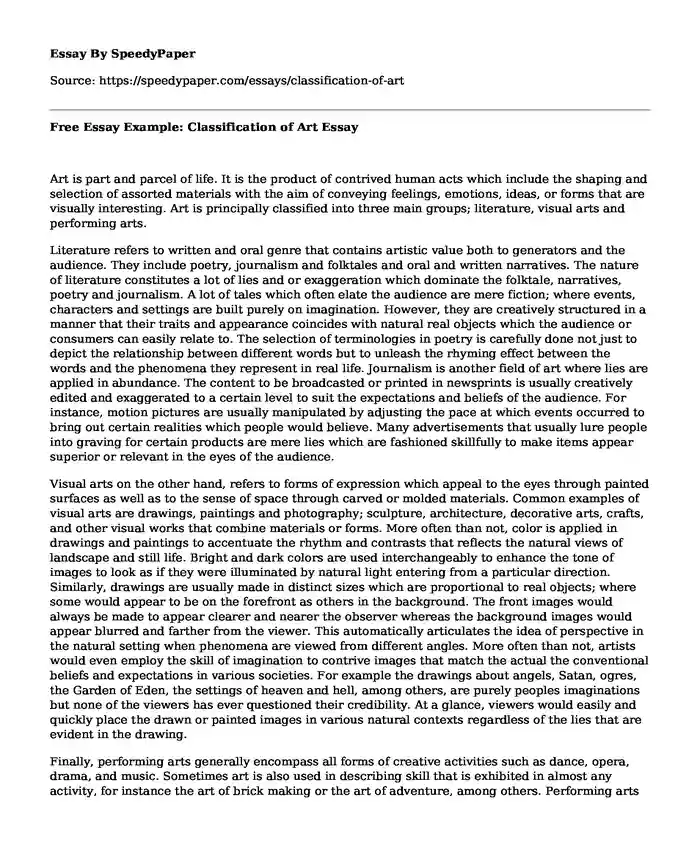Art is part and parcel of life. It is the product of contrived human acts which include the shaping and selection of assorted materials with the aim of conveying feelings, emotions, ideas, or forms that are visually interesting. Art is principally classified into three main groups; literature, visual arts and performing arts.
Literature refers to written and oral genre that contains artistic value both to generators and the audience. They include poetry, journalism and folktales and oral and written narratives. The nature of literature constitutes a lot of lies and or exaggeration which dominate the folktale, narratives, poetry and journalism. A lot of tales which often elate the audience are mere fiction; where events, characters and settings are built purely on imagination. However, they are creatively structured in a manner that their traits and appearance coincides with natural real objects which the audience or consumers can easily relate to. The selection of terminologies in poetry is carefully done not just to depict the relationship between different words but to unleash the rhyming effect between the words and the phenomena they represent in real life. Journalism is another field of art where lies are applied in abundance. The content to be broadcasted or printed in newsprints is usually creatively edited and exaggerated to a certain level to suit the expectations and beliefs of the audience. For instance, motion pictures are usually manipulated by adjusting the pace at which events occurred to bring out certain realities which people would believe. Many advertisements that usually lure people into graving for certain products are mere lies which are fashioned skillfully to make items appear superior or relevant in the eyes of the audience.
Visual arts on the other hand, refers to forms of expression which appeal to the eyes through painted surfaces as well as to the sense of space through carved or molded materials. Common examples of visual arts are drawings, paintings and photography; sculpture, architecture, decorative arts, crafts, and other visual works that combine materials or forms. More often than not, color is applied in drawings and paintings to accentuate the rhythm and contrasts that reflects the natural views of landscape and still life. Bright and dark colors are used interchangeably to enhance the tone of images to look as if they were illuminated by natural light entering from a particular direction. Similarly, drawings are usually made in distinct sizes which are proportional to real objects; where some would appear to be on the forefront as others in the background. The front images would always be made to appear clearer and nearer the observer whereas the background images would appear blurred and farther from the viewer. This automatically articulates the idea of perspective in the natural setting when phenomena are viewed from different angles. More often than not, artists would even employ the skill of imagination to contrive images that match the actual the conventional beliefs and expectations in various societies. For example the drawings about angels, Satan, ogres, the Garden of Eden, the settings of heaven and hell, among others, are purely peoples imaginations but none of the viewers has ever questioned their credibility. At a glance, viewers would easily and quickly place the drawn or painted images in various natural contexts regardless of the lies that are evident in the drawing.
Finally, performing arts generally encompass all forms of creative activities such as dance, opera, drama, and music. Sometimes art is also used in describing skill that is exhibited in almost any activity, for instance the art of brick making or the art of adventure, among others. Performing arts are popular choreographies which are widely embraced despite constituting a greater percentage of lies as well. Music and drama for instance, are usually composed on mere imagination where characters may seem to possess traits that are similar to the people and objects in real life setting. The content is also made to follow a particular rhythm which captures the attention of the audience triggering the sense of credible conviction in the themes contained in respective genres.
Therefore, regarded as an imperative component of culture in the society, art provides a conduit through which different people can express their imagination and personal vision. It offers a range of intellectual and emotional pleasures to the audience or its consumers and is an important way in which all cultures are represented.
Cite this page
Free Essay Example: Classification of Art. (2019, May 28). Retrieved from https://speedypaper.com/essays/classification-of-art
Request Removal
If you are the original author of this essay and no longer wish to have it published on the SpeedyPaper website, please click below to request its removal:
- Failure Essay Samples
- Motivation for Academic Writing, Free Paper for Students
- Cultural Differences in Decision-Making, Free Essay Sample
- Terrorists Behavioral Analysis, Essay Sample
- President Andrew Jackson and the Removal of Indians
- Free Essay Sample on Pullman's Strike
- Paper Example. Continuous Monitoring for Security Domain: Challenges and Solutions
Popular categories





